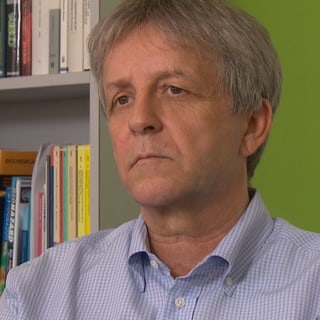French President Emmanuel Macron does not want to rule out deploying Western ground troops in Ukraine one day. And Russia regularly flexes its nuclear muscles in admonishments to the West. For ETH security expert Oliver Thränert, both behaviors are like playing with fire.
What is the concept of nuclear deterrence?
It’s about influencing the calculations of the potential opponent. It must be clear to the opponent that if an attack occurs, a counterattack will occur that will cause unacceptable damage.
What role does nuclear deterrence play in Russia’s war of aggression against Ukraine?
In my opinion, a bigger one than many people realize. Let’s imagine war in a world without nuclear weapons. This would increase the likelihood that Western states would supply more and, above all, more extensive weapons to Ukraine. Conversely, Russia would try to directly attack the delivery routes via NATO countries. Then we would probably be dealing with a larger conflict that would be fought with conventional weapons. Currently, neither the Russians nor the Western states have any interest in the conflict escalating beyond Ukraine. A war between Russia and NATO in the nuclear age poses a great risk of nuclear war. Not even Putin wants that.
President Macron said yesterday after the Ukraine conference with 20 states that he was not ruling out the use of Western ground troops. How do you assess this step against the background of the current nuclear discussion?
I think Macron’s statement can be interpreted as another attempt on his part to take a leadership role on the issue of Ukraine’s defense. I agree with him that it would be bad for Europe if Ukraine lost the war. Especially for Western Europe. This war is not just about Ukraine, but also about the future of European security. But in my opinion, sending our own ground troops would provoke an escalation that could lead to nuclear escalation. That would be exactly the scenario that Western governments are trying to avoid.
So an extremely sensitive statement from the French President?
Yes, and I also wonder to what extent President Macron coordinated this statement with the other Western heads of government. I doubt that German Chancellor Scholz would be willing to deploy Bundeswehr soldiers directly in the conflict.
During the Cold War, the Soviet Union and the United States concluded disarmament and arms control treaties. Why was that possible back then?
The Cuban Missile Crisis was still deeply affecting both major powers. It showed how easily an all-out nuclear war could occur. In addition, the Soviet Union was happy with the status quo of its power in Europe at the time. The Americans grudgingly accepted this. Today it’s different. Russia is questioning the European security architecture. Moscow wants to bring former Soviet states back under Russian control, which the West does not accept. It’s a balancing act for the West: on the one hand, it has to equip Ukraine so that it doesn’t lose the war, but on the other hand, the war in Ukraine must not escalate into a nuclear war in Europe.
The interview was conducted by Simone Hulliger, assisted by Géraldine Jäggi
